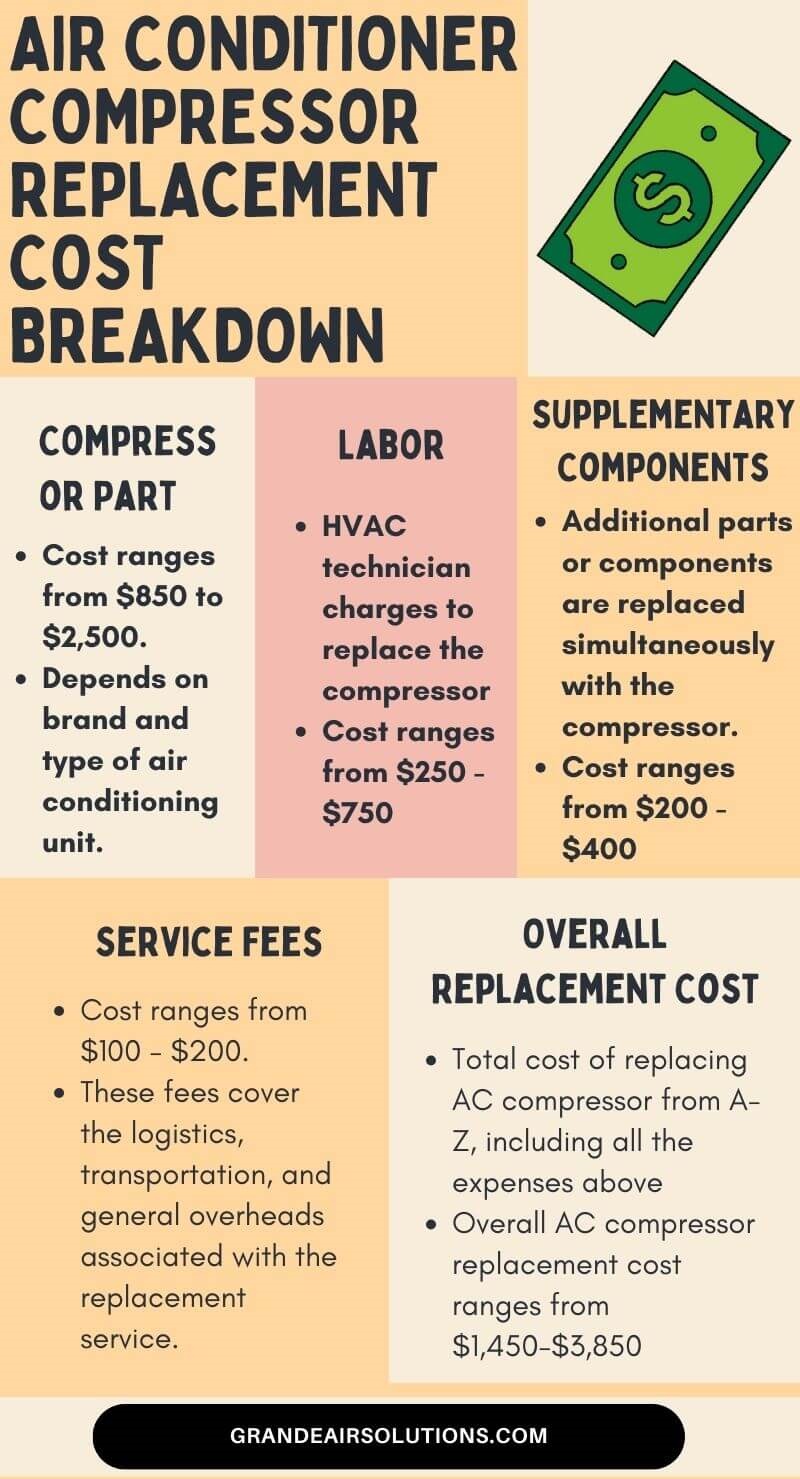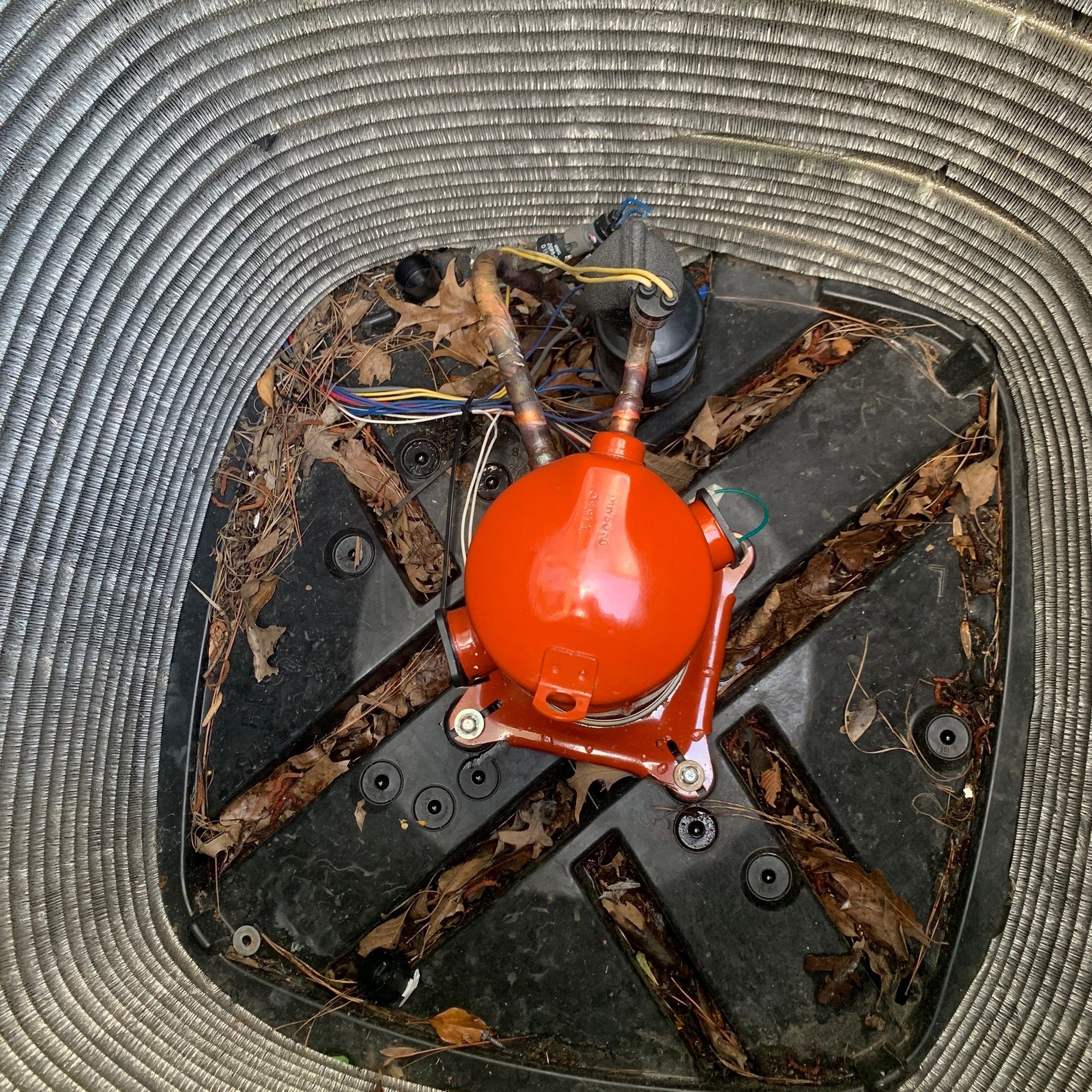The cost to replace an air conditioning compressor typically ranges from $800 to $2,500. Factors like the unit’s size and labor rates influence the final price.
Air conditioning compressors play a crucial role in cooling your home. Over time, wear and tear can lead to failures, requiring replacement. Understanding the associated costs is vital for homeowners. This investment can enhance your system’s efficiency and lifespan. It’s essential to consider both the compressor’s price and installation expenses.
Researching options and obtaining multiple quotes can help you find the best deal. Regular maintenance can also extend the life of your compressor, potentially saving you money in the long run. Prioritize quality and warranties for a reliable air conditioning solution.
Introduction To Ac Compressor Replacement
Replacing an AC compressor is essential for optimal cooling. The compressor is the heart of your air conditioning system. Understanding its role helps homeowners make informed decisions. Knowing the replacement cost can save you from unexpected expenses.
Significance Of The Compressor In Ac Systems
The AC compressor plays a crucial role in cooling your home. It compresses refrigerant and circulates it through the system. A functioning compressor ensures efficient cooling performance. Without it, the system cannot cool effectively.
- Heat Absorption: The compressor absorbs heat from indoors.
- Pressure Regulation: It maintains proper refrigerant pressure.
- Energy Efficiency: A good compressor improves system efficiency.
Common Signs Of Compressor Failure
Recognizing compressor failure early can save money. Here are some common signs:
- Unusual Noises: Grinding or clanking sounds indicate issues.
- Inconsistent Cooling: Rooms may feel warm or unevenly cooled.
- Increased Energy Bills: A spike in bills suggests inefficiency.
- Freon Leaks: Puddles or hissing sounds indicate leaks.
Addressing these signs quickly can prevent costly repairs.

Credit: homeguide.com
Analyzing Replacement Costs
Understanding the costs of replacing an air conditioning compressor is crucial. It helps homeowners budget effectively. Knowing the factors that influence costs can save money and time. This section explores these factors and provides average cost ranges.
Factors Influencing Compressor Replacement Expenses
- Type of AC System: Central, window, or portable units vary in cost.
- Brand: Premium brands often cost more for parts and labor.
- Labor Costs: Rates differ by location and technician expertise.
- Old vs. New: Older systems may need more adjustments.
- Warranty Status: Warranties can reduce out-of-pocket expenses.
- Seasonal Demand: Costs may rise in peak summer months.
Average Cost Range For Different Ac Systems
| AC System Type | Average Replacement Cost |
|---|---|
| Central AC | $1,200 – $2,500 |
| Window AC | $300 – $700 |
| Portable AC | $400 – $900 |
| Ductless Mini-Split | $1,000 – $3,000 |
These averages provide a general idea. Actual costs can vary. Always get multiple quotes before deciding.
Cost Breakdown
Understanding the costs involved in air conditioning compressor replacement is essential. This section breaks down the various expenses. It covers component costs and labor charges. Knowing these details helps you budget wisely.
Component Costs
Components directly affect the overall price of compressor replacement. The primary component is the air conditioning compressor itself. Here’s a quick overview of the costs:
| Component | Estimated Cost |
|---|---|
| Air Conditioning Compressor | $800 – $2,500 |
| Condenser Coil | $500 – $1,500 |
| Expansion Valve | $100 – $300 |
| Refrigerant | $100 – $200 |
The compressor itself is the most significant expense. Prices vary based on brand and model. Other components can also contribute to the total cost.
Labor Charges And Service Fees
Labor charges are another major factor. Hiring a professional ensures proper installation. Here’s a breakdown of typical labor costs:
- Hourly Rate: $75 – $150
- Estimated Hours: 3 – 6 hours
- Service Fee: $50 – $100
In total, labor costs can range from $300 to $900. This depends on the complexity of the job. Always ask for a detailed estimate before starting the work.
Consider the total cost before making your decision. Understanding these details helps avoid surprises later.

Credit: grandeairsolutions.com
Saving Strategies
Replacing an air conditioning compressor can be expensive. Explore these saving strategies to reduce costs effectively.
Preventive Maintenance Tips
Regular maintenance helps extend your compressor’s life. Use these tips:
- Change Filters: Replace air filters every 1-3 months.
- Clean Coils: Clean the outdoor coils at least once a year.
- Check Refrigerant Levels: Ensure proper refrigerant levels to avoid strain.
- Inspect Wiring: Check electrical connections for wear and tear.
- Schedule Professional Tune-Ups: Get annual inspections from a qualified technician.
Seasonal Discounts And Deals
Take advantage of seasonal discounts to save money.
| Season | Typical Discounts |
|---|---|
| Spring | 10-20% off on maintenance services |
| Summer | 5-15% off on new units |
| Fall | 15-25% off on repairs |
| Winter | 10-30% off on system upgrades |
Check local HVAC companies for special offers. Sign up for newsletters to receive updates. Timing your replacement can lead to significant savings.
Diy Replacement: Is It Worth It?
Replacing an air conditioning compressor can be costly. Many homeowners consider doing it themselves to save money. But is a DIY replacement really worth the effort? Let’s explore the pros and cons.
Pros And Cons Of Diy
| Pros | Cons |
|---|---|
| Cost Savings: No labor fees to pay. | Risk of Mistakes: Errors can lead to more costs. |
| Learning Experience: Gain hands-on skills. | Time-Consuming: Can take longer than expected. |
| Flexibility: Work at your own pace. | Safety Risks: Working with refrigerants can be dangerous. |
Required Tools And Expertise
Before attempting a DIY air conditioning compressor replacement, gather necessary tools:
- Wrenches: For loosening and tightening bolts.
- Refrigerant Recovery Machine: To handle refrigerants safely.
- Vacuum Pump: To remove moisture from the system.
- Manifold Gauge Set: For checking pressure.
Evaluate your expertise:
- Do you understand HVAC systems?
- Are you comfortable working with electrical components?
- Have you replaced any major appliances before?
Assess your comfort level with these tools and tasks. Taking on a DIY project can save money but requires skill and patience.
Choosing The Right Compressor
Choosing the right compressor is vital for your air conditioning system. A proper selection ensures efficiency and longevity. It can also affect your overall costs.
Compatibility And Performance
Check the compatibility of the compressor with your AC unit. Here are key factors to consider:
- Brand: Match the compressor brand with your system.
- Model: Ensure the model fits your specific AC unit.
- Cooling Capacity: Choose a compressor with suitable BTU ratings.
- Refrigerant Type: Ensure it uses the correct refrigerant.
Performance is crucial. A mismatched compressor can lead to:
- Poor cooling efficiency
- Higher energy bills
- Frequent breakdowns
Always consult a professional for advice. They can guide you in choosing the right compressor.
Warranty And Longevity Considerations
Warranties vary by manufacturer. A solid warranty offers peace of mind. Look for:
- Length: Longer warranties often indicate quality.
- Coverage: Check what parts are covered.
- Service: Know the terms for service and repairs.
Longevity matters. A reliable compressor lasts longer and saves money. Consider these aspects:
| Factor | Importance |
|---|---|
| Build Quality | High-quality materials extend lifespan. |
| Energy Efficiency | Efficient models reduce energy costs. |
| Brand Reputation | Well-known brands often provide better longevity. |
Investing in the right compressor pays off in the long run.
Professional Installation Vs. Diy
Choosing between professional installation and DIY for your air conditioning compressor replacement can be tough. Each option has its own set of benefits and challenges. Understanding these factors can help you make the best decision for your home and budget.
Evaluating The Trade-offs
Here are some key points to consider:
- Cost: DIY may seem cheaper initially.
- Skill Level: Assess your own repair skills.
- Time: DIY can take longer than hiring a pro.
- Warranty: Professional work often comes with a warranty.
- Tools: You may need special tools for DIY.
Table below compares costs:
| Option | Estimated Cost | Time Required |
|---|---|---|
| DIY | $200 – $600 | 3 – 6 hours |
| Professional | $800 – $2,500 | 2 – 4 hours |
When To Call The Professionals
Consider these scenarios for professional help:
- Complex installations needing specific skills.
- Limited time to complete the project.
- Uncertainty about your ability to handle the job.
- Safety concerns with electrical systems.
- Need for a warranty on the installation.
Hiring a professional ensures proper installation. This can enhance the efficiency and lifespan of your air conditioning system.
Long-term Savings
Replacing your air conditioning compressor may seem costly. However, the long-term savings can outweigh the initial expense. A new compressor can improve energy efficiency and reduce utility bills significantly. Investing in a quality replacement pays off over time.
Energy-efficient Models
Energy-efficient compressors use less power. This results in lower electricity bills. Here are some key benefits:
- Lower Energy Costs: Energy-efficient models can save up to 30% on energy bills.
- Environmentally Friendly: Less energy consumption reduces your carbon footprint.
- Improved Comfort: New compressors maintain better temperature control.
Consider these energy-efficient ratings:
| Model Type | SEER Rating | Estimated Annual Savings |
|---|---|---|
| Standard Model | 14 | $200 |
| High-Efficiency Model | 18 | $300 |
| Ultra-Efficient Model | 22 | $400 |
Rebates And Incentives For Upgrades
Many local and federal programs offer rebates for energy-efficient upgrades. These incentives can significantly reduce your upfront costs.
- Federal Tax Credits: Claim a percentage of the cost on your taxes.
- Utility Company Rebates: Some companies provide cash back for energy-efficient installations.
- State Programs: Check for state-specific incentives or grants.
Research available rebates in your area. This can help maximize your savings. Contact local HVAC professionals for guidance on available programs.

Credit: www.bluewaterclimatecontrol.com
Frequently Asked Questions
What Is The Average Cost Of Compressor Replacement?
The average cost for air conditioning compressor replacement ranges from $800 to $2,500. This includes both parts and labor. Factors influencing the price include the type of compressor, your location, and the complexity of the installation. Always get multiple quotes for the best deal.
How Long Does It Take To Replace A Compressor?
Replacing an air conditioning compressor typically takes about 4 to 8 hours. The duration depends on the unit’s accessibility and the technician’s experience. If additional repairs are needed, it may take longer. Proper installation is crucial for the unit’s efficiency and longevity.
Can I Replace The Compressor Myself?
While it’s possible to replace the compressor yourself, it’s not recommended. The process requires specialized tools and knowledge of refrigerants. Improper installation can lead to costly damage and safety hazards. Hiring a professional ensures the job is done correctly and efficiently.
What Are The Signs Of A Failing Compressor?
Common signs of a failing air conditioning compressor include unusual noises, warm air from vents, and frequent cycling. You may also notice increased energy bills or a refrigerant leak. Addressing these issues promptly can prevent further damage and costly repairs.
Conclusion
Replacing an air conditioning compressor can be a significant expense. Understanding the factors that influence the cost is essential for budgeting. Always seek multiple quotes from licensed professionals to ensure fair pricing. Investing in regular maintenance can extend the life of your system, ultimately saving you money in the long run.

